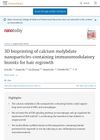 3 citations,
June 2023 in “Nano today”
3 citations,
June 2023 in “Nano today” A special bioink with nanoparticles helps regrow hair by reducing inflammation and promoting hair growth signals.
3 citations,
May 2022 in “Pediatric Critical Care Medicine” The patient recovered well and returned to college without any lasting issues.
 1 citations,
March 2023 in “Aggregate”
1 citations,
March 2023 in “Aggregate” A new hydrogel with micronized amnion helps achieve better, scar-free skin healing.
 1 citations,
December 2020 in “Acta dermato-venereologica”
1 citations,
December 2020 in “Acta dermato-venereologica” Some scalp sores are linked to different inherited skin conditions.
 August 2023 in “Dermatologic Surgery”
August 2023 in “Dermatologic Surgery” Person-to-person hair transplants can work for patients on lifelong immunosuppression, with high hair growth success.
 March 2018 in “Journal of Pre-Clinical and Clinical Research”
March 2018 in “Journal of Pre-Clinical and Clinical Research” Skin problems are common in kidney disease, with dry skin and itching in patients not on dialysis or on hemodialysis, and infections most common in transplant recipients.
 March 2023 in “Research Square (Research Square)”
March 2023 in “Research Square (Research Square)” Immune changes and specific genes contribute to male hair loss.
355 citations,
January 2017 in “Journal of the American Academy of Dermatology” JAK inhibitors show promise for treating skin conditions like eczema, hair loss, and psoriasis.
 67 citations,
May 2014 in “International Journal of Molecular Sciences”
67 citations,
May 2014 in “International Journal of Molecular Sciences” Using your own skin cells can help repair aging skin and promote hair growth.
45 citations,
June 2018 in “Frontiers in immunology” MDSC-Exo can treat autoimmune alopecia areata and promote hair regrowth in mice.
40 citations,
October 2012 in “Dermatologic clinics” More research is needed to understand the genetic causes of Alopecia areata to develop better treatments.
33 citations,
January 2018 in “Blood” Ruxolitinib helps protect skin stem cells and keeps skin healthy in mice with skin GVHD.
32 citations,
January 2006 in “Liver transplantation” Vitamin A toxicity can cause severe health issues and may require a liver transplant if other treatments fail.
29 citations,
June 2015 in “Kidney International” Disrupting the Flcn gene in mice causes early kidney cysts and tumors, which can be treated with rapamycin.
22 citations,
January 2012 in “Mediators of inflammation” Nonantibiotic macrolides show promise for treating various inflammatory skin conditions.
 19 citations,
January 2017 in “International Journal of Trichology”
19 citations,
January 2017 in “International Journal of Trichology” The document concludes that injecting platelet-rich plasma can effectively treat androgenetic alopecia, a type of hair loss.
 15 citations,
January 2023 in “Biomaterials Research”
15 citations,
January 2023 in “Biomaterials Research” 3D bioprinting in plastic surgery could lead to personalized grafts and fewer complications.
 15 citations,
September 2021 in “Archives of Plastic Surgery”
15 citations,
September 2021 in “Archives of Plastic Surgery” The document concludes that facial feminization surgery improves psychological well-being and social acceptance for transgender individuals.
14 citations,
January 2019 in “Annals of plastic surgery” Face transplant for a severe autoimmune disease patient was successful, improving appearance and function without disease relapse after three years.
13 citations,
September 2022 in “Frontiers in immunology” Ifidancitinib, a JAK inhibitor, effectively regrows hair in mice with alopecia by tiring out harmful T cells.
 13 citations,
November 2017 in “Journal of Cellular and Molecular Medicine”
13 citations,
November 2017 in “Journal of Cellular and Molecular Medicine” The workshop discussed the role of a protein called calreticulin in health and disease, its potential as a treatment target, and its possible use as a disease marker.
11 citations,
October 2021 in “Orphanet journal of rare diseases” Patients with RASopathies are at risk for autoimmune disorders and should be routinely screened.
10 citations,
June 2016 in “PLOS ONE”  9 citations,
July 2022 in “EMBO molecular medicine”
9 citations,
July 2022 in “EMBO molecular medicine” Blocking certain immune signals can reduce skin damage from radiation therapy.
 8 citations,
July 2022 in “BMC neuroscience”
8 citations,
July 2022 in “BMC neuroscience” Transplanted hair follicle stem cells improved brain function and reduced damage after a stroke in rats.
 6 citations,
January 2015 in “Journal of regenerative medicine & tissue engineering”
6 citations,
January 2015 in “Journal of regenerative medicine & tissue engineering” The review concludes that innovations in regenerative medicine, tissue engineering, and developmental biology are essential for effective tissue repair and organ transplants.
 6 citations,
September 2012 in “Our Dermatology Online”
6 citations,
September 2012 in “Our Dermatology Online” Retinoids are effective for various skin conditions and hair loss but have serious side effects, so low doses are recommended.
 5 citations,
January 2020 in “Bioscience Reports”
5 citations,
January 2020 in “Bioscience Reports” Certain changes in the VEGF gene can increase or decrease the risk of polycystic ovary syndrome.
 4 citations,
January 2022 in “Transfusion Medicine and Hemotherapy”
4 citations,
January 2022 in “Transfusion Medicine and Hemotherapy” Platelet-Rich Plasma (PRP) has potential benefits in plastic surgery, especially for skin grafts, wound healing, hair loss, mild Carpal Tunnel Syndrome, and TMJ disorders, but more research is needed to confirm its effectiveness.
 4 citations,
November 2021 in “Cancers”
4 citations,
November 2021 in “Cancers” The document concludes that understanding and managing hair loss in cancer patients is important, and more research is needed for better treatments.


















